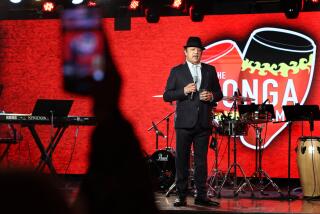POP MUSIC REVIEW : Toure Kunda Stirs Tasty Blend in Melting Pot
- Share via
Wednesday night’s performance at the Wiltern was a textbook example of pop music as a cultural melting pot.
Start with headliners Toure Kunda, the Paris-based African pop group founded by three half-brothers from Senegal and rounded out by French, African and West Indian musicians. Toss in second-billed Strunz and Farah, a flamenco/Latin/jazz octet led by guitarists Jorge Strunz (a native of Costa Rica) and Ardeshir Farah (originally from Iran) with a pan-Latin contingent of percussionists from Puerto Rico, Cuba and Mexico. Add the Gypsy guitarist playing in the lobby during intermission and you have a cross-cultural co-mingling light years removed from the standard pop concert.
Toure Kunda alone offered enough variety to satiate even the most eclectic listener during its enthusiastically received 90-minute set. Centered around sibling percussionists/vocalists Ismaila, Sixu Tidiane and Ousmane Toure, the 10-piece ensemble incorporated reggae, sophisticated Euro-pop, dance-floor rhythms, African-rooted percussion forays, blazing R&B; sax licks in a King Curtis vein, traces of doo-wop harmonies, and even some bouncy Top 40 pop.
But Toure Kunda’s wide-ranging style was both a blessing and a curse. While it largely circumvented the “it all sounds the same” criticism common to African pop, the constant shifts in musical focus fostered the nagging feeling that the sum of the group’s individual parts was greater than the whole.
The group’s Senegalese roots were ever-present--particularly in the frequent unison lead vocals and backing harmonies--but Toure Kunda employed them as only one element in its multi-cultural blend. That mix ‘n’ match approach produced an early highlight when an atmospheric introduction that evoked a star-filled African night smoothly segued into a magnetic reggae song topped by a Ben Belinga sax melody that was echoed by guitar and keyboards to create a mesmerizing climax.
The performance flattened out after that peak, but Toure Kunda’s superbly presented set benefited enormously from the band’s crack musicianship and the brothers’ vocalizing, with Ousmane--whose high, wistful voice somehow recalled the unlikely trio of reggae’s Eek-A-Mouse, the late Frankie Lymon and Del Shannon--standing as the best of the bunch.
There was a surprising strain of ‘50s R&B; innocence running through the material, which may account for the band’s reputation as the most popular African band in Europe. While the group sang in several tribal languages and French, there was no sense of an imposing cultural barrier to hurdle which could prevent an audience that didn’t understand the lyrics from responding to the music.
But as the set progressed, the band’s reliance on its versatility increasingly seemed to camouflage material that offered little more than lightweight dance grooves. Toure Kunda’s performance ultimately came across as a “something for everyone” cross section of music the disc jockey at a hip European dance club might play--enjoyable in the heat of the moment but gone with the wind soon after the last note was played.
More to Read
The biggest entertainment stories
Get our big stories about Hollywood, film, television, music, arts, culture and more right in your inbox as soon as they publish.
You may occasionally receive promotional content from the Los Angeles Times.






